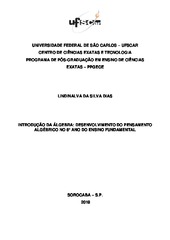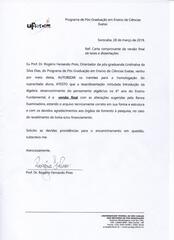| dc.contributor.author | Dias, Lindinalva da Silva | |
| dc.date.accessioned | 2019-03-20T15:02:27Z | |
| dc.date.available | 2019-03-20T15:02:27Z | |
| dc.date.issued | 2019-02-27 | |
| dc.identifier.citation | DIAS, Lindinalva da Silva. Introdução da álgebra: desenvolvimento do pensamento algébrico no 6° ano do ensino fundamental. 2019. Dissertação (Mestrado em Ensino de Ciências Exatas) – Universidade Federal de São Carlos, São Carlos, 2019. Disponível em: https://repositorio.ufscar.br/handle/ufscar/11105. | * |
| dc.identifier.uri | https://repositorio.ufscar.br/handle/ufscar/11105 | |
| dc.description.abstract | The present research presents a study about algebraic thoughts expressed by students of the 6th grade of elementary school. The research’s objective was to investigate the implications of a teaching sequence, based on problem solving, in the introduction of the initial thoughts of algebra with 6th grade students. This is a qualitative research and it is based on Ponte, Branco and Matos (2009) and Booth (1994). The research was applied to 19 students from the 6th grade of Elementary School of a public school at Sorocaba city, state of São Paulo. The students were divided in pairs and underwent a teaching intervention consisting of 6 meetings of 50 minutes each, in which 6 activity sheets were distributed. The students were divided in pairs to work with the activities. From the activities developed by the students it was possible to analyze and verify they better understood the concepts involved in the practical and pictorial parts, it means, activities involving figures to represent the context of the statement, besides the manipulation of the two-plate scale, and manipulative objects such as EVA. It is also important to note that the algebraic activities (equations), in which the values of the unknowns were given to the students, did not show any difficulty, but an activity in which they had to "find out" the value of the unknown was difficult to understand the equivalence between the two members of the equation. The relevance of this research is due to the fact that it is important to work with the students at the beginning of their study with algebra starts, mainly with playful and practical activities. As students begin to have contact with algebra from the 7th grade of Elementary School. | por |
| dc.language.iso | por | por |
| dc.publisher | Universidade Federal de São Carlos | por |
| dc.rights.uri | Acesso aberto | por |
| dc.subject | Álgebra, Ensino Fundamental, situações problema, ensino e aprendizagem. | por |
| dc.subject | Algebra, Elementary education, problem situations, teaching and learning | por |
| dc.title | Introdução da álgebra: desenvolvimento do pensamento algébrico no 6° ano do ensino fundamental | por |
| dc.title.alternative | Introduction of algebra: development of algerian thought in the 6th grade of elementary school | por |
| dc.type | Dissertação | por |
| dc.contributor.advisor1 | Pires, Rogério Fernando | |
| dc.contributor.advisor1Lattes | http://lattes.cnpq.br/2795801064535157 | por |
| dc.description.resumo | A presente pesquisa apresenta um estudo a respeito de pensamentos algébricos manifestados por alunos do 6° ano do Ensino Fundamental. O objetivo desta pesquisa foi investigar as implicações de uma sequência de ensino, pautada na resolução de problemas, na introdução das noções iniciais de álgebra com alunos do 6º ano do Ensino Fundamental. Esta investigação é de caráter qualitativo e está fundamentada em Ponte, Branco e Matos (2009) e Booth (1994). O estudo foi realizado com 19 alunos do 6° ano do Ensino Fundamental de uma escola pública da cidade de Sorocaba, estado de São Paulo. Os estudantes foram divididos em duplas, sendo um aluno que se ofereceu a participar individualmente das atividades, passando assim por uma intervenção de ensino constituídas de 6 encontros de 50 minutos cada, nos quais foram distribuídas 6 fichas de atividades. Os estudantes foram divididos em dupla para a realização de tais atividades. A partir das atividades realizada pelos alunos foi possível analisar e constatar que eles compreenderam melhor os conceitos envolvidos nas partes prática e a parte pictórica, ou seja, as atividades que envolviam figuras para representar o contexto do enunciado, além da manipulação da balança de dois pratos, e objetos manipulativos como EVA. Também é importante destacar que as atividades algébricas (equações), nas quais os valores das incógnitas eram dadas os alunos, os mesmos não tiveram nenhuma dificuldade, porém atividade em que eles teriam que “descobrir” o valor da incógnita houve mais dificuldades em compreender a equivalência entre os dois membros da equação. A relevância desta pesquisa se dá pelo fato de se tornar importante trabalhar com os alunos ainda no início de sua escolaridade as noções de álgebra, principalmente com atividades lúdicas e práticas. Visto que os alunos passam a ter contato com a álgebra a partir do 7° ano do Ensino Fundamental. | por |
| dc.publisher.initials | UFSCar | por |
| dc.publisher.program | Programa de Pós-Graduação em Ensino de Ciências Exatas - PPGECE | por |
| dc.subject.cnpq | CIENCIAS EXATAS E DA TERRA::MATEMATICA::ALGEBRA::CONJUNTOS | por |
| dc.ufscar.embargo | Online | por |
| dc.publisher.address | Câmpus São Carlos | por |
| dc.contributor.authorlattes | http://lattes.cnpq.br/6075079355441338 | por |

